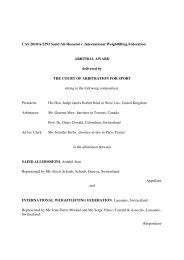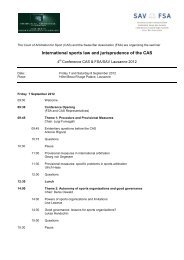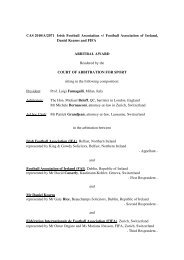(CAS) Bulletin - Tribunal Arbitral du Sport / TAS
(CAS) Bulletin - Tribunal Arbitral du Sport / TAS
(CAS) Bulletin - Tribunal Arbitral du Sport / TAS
You also want an ePaper? Increase the reach of your titles
YUMPU automatically turns print PDFs into web optimized ePapers that Google loves.
damage. There is wilful damage when the employee<br />
has the intent of causing a damage to the employer<br />
(e.g. theft, forgery, fraud, …). The dolus eventualis is<br />
suffi cient, for example when an employee has not the<br />
direct intent of causing a damage to his employer,<br />
but knows or should know that his behaviour will<br />
cause a damage to the employer, for example when he<br />
leaves his working place (that is, when he unilaterally<br />
terminates his employment contract) without just<br />
cause (Caruzzo P., Le contrat indivi<strong>du</strong>el de travail,<br />
Commentaire des articles 319 à 341 <strong>du</strong> Code des<br />
obligations, Zurich 2009, n. 8 p. 173; Streiff/von<br />
Kaenel, Arbeitsvertrag, Praxiskommentar zu Art.<br />
319-362 OR, 6th ed., Zurich 2006, n. 6 ad Art. 323b<br />
CO, with further references; STAEHELIN/VISCHER, op.<br />
cit., no 15 ad art. 323b).<br />
The Panel notes that the Player has not argued that<br />
the part of the salary paid to him was in any way<br />
insuffi cient for him to live. In fact, it has remained<br />
undisputed between the parties that the Club<br />
continued to pay part of the salary but also that<br />
considerable bonuses were paid to the Player until he<br />
left the Club.<br />
Therefore, the Panel is satisfi ed that the set-off by<br />
the Club of its claim resulting from the breach of<br />
clause 7.1 by the Player against part of the Player’s<br />
salary claim was in line with the restrictions set out<br />
in article 323b Swiss CO. Furthermore, the Panel is<br />
not satisfi ed that the Club was prevented to set-off its<br />
claim because of a “general principle of law”, as argued<br />
by the Player.<br />
Finally, based on the evidence pro<strong>du</strong>ced by the parties,<br />
the Panel is satisfi ed that also the other requirements<br />
for a set-off mentioned above were met. In particular,<br />
it has remained undisputed between the parties that<br />
for several months the parties were discussing whether<br />
or not the Club, as employer, was or was not entitled<br />
to pay only a part of the salary. Therefore, not only<br />
for the Club but also for the Player it was clear that<br />
the Club had the intention, and in fact executed, a setoff<br />
of its claim based on clause 7.1 of the Agreement<br />
against the salary of the Player. Since, as mentioned<br />
above, Swiss Law and in particular article 124 of the<br />
Swiss CO does not request a formal notifi cation of<br />
set-off, it cannot be argued by the Player, and in fact<br />
the Player did not raise this argument, that it was<br />
unclear for him that the Club had the intention to setoff<br />
the claim for compensation based on clause 7.1<br />
of the Agreement with part of the salary. The Panel<br />
is well aware that in the past, there have been clubs<br />
that have tried to justify a failure to pay whole or part<br />
of the salary to a player, by alleging counterclaims.<br />
Such counterclaims, often raised only ex post, have<br />
been correctly considered as mere abusive attempts<br />
of clubs to justify their failure. However, based on<br />
the specifi c circumstances of the present dispute, the<br />
Panel is satisfi ed that the Claimant had no abusive<br />
intent when it declared to set-off its claim against<br />
part of the salary of the Player.<br />
For all these reasons, the Panel concludes that the<br />
Club was entitled to set-off its claim against part of<br />
the salary of the Player, as it did. Accordingly, the<br />
Player was not entitled to terminate the Agreement<br />
as he did: the set-off by the Club of its claim based<br />
on clause 7.1 of the Agreement against the salary was<br />
not a breach of the Club of its obligations, even if the<br />
claim based on clause 7.1 was contested (cf. article<br />
120 para. 2 Swiss CO).<br />
The termination of the Agreement by the Player was<br />
therefore without just cause.<br />
4. The consequences of the breach<br />
At this stage, the Panel shall determine the<br />
consequences of the referred Agreement’s termination<br />
without just cause, in accordance with the parties’<br />
petitions in this respect and the applicable rules.<br />
In this respect the Panel notes that:<br />
- The Claimant has requested that (i) the Player is<br />
ordered to pay a compensation, (ii) Desportivo<br />
Brasil and/or São Paulo and or any subsequent<br />
new club of the Player is held joint and severally<br />
liable to pay such compensation and (iii) it is<br />
acknowledged that sporting sanctions may be<br />
requested by the Club against the Respondent and<br />
Desportivo Brasil and/or São Paulo and/or any<br />
subsequent new club of the Player at the relevant<br />
FIFA Dispute Resolution Body in the future.<br />
- The rules to be applied are those contained in<br />
the FIFA RSTP and Swiss Law, for the grounds<br />
already explained above.<br />
4.1 The calculation of the compensation <strong>du</strong>e to the<br />
Club<br />
To such purpose the Panel shall take as standpoint<br />
the provisions of article 17.1 of the FIFA RSTP,<br />
which reads as follows:<br />
The following provisions apply if a contract is terminated<br />
without just cause:<br />
1. In all cases, the party in breach shall pay compensation.<br />
Subject to the provisions of article 20 and Annexe 4 in relation<br />
to training compensation, and unless otherwise provided for in<br />
the contract, compensation for the breach shall be calculated<br />
Jurisprudence majeure / Leading cases<br />
-<br />
82





